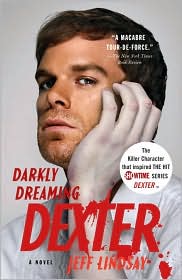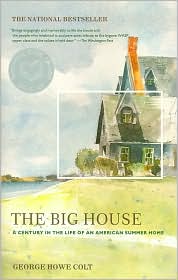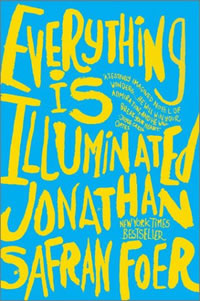 Darkly Dreaming Dexter, by Jeff Lindsay
Darkly Dreaming Dexter, by Jeff LindsayThe basis for Showtime’s Emmy nominated “Dexter,” that just previously finished its third season, is this wonderfully original series by Jeff Lindsay. You’ve seen cat-and-mouse mystery thrillers before, but none like this from a truly unique point of view.
Dexter Morgan, a blood-splatter forensic analyst for the Miami police department, goes above and beyond to catch the bad guy. If there is not enough evidence to catch the murderer and put him behind bars for good, Dexter takes care of it himself. However, Dexter’s secret is not that he is a superhero; Dexter Morgan is a serial killer. Here’s the catch, he only kills the bad guys. He fakes a normal life with his girlfriend Rita and his cop sister Deborah, but things become more complicated when a series of murders start to mimic Dexter’s method. As a child, Dexter was found on a brutal crime scene where his mother was murdered. The officer on scene, Harry, became Dexter’s foster father, but it wasn’t long before Harry started to see the beginnings of Dexter’s dark side. Instead of kicking that badness out, Harry trained Dexter to have a conscience and only get those that the law could not get by itself. He was also trained to never get caught. When this new series of murders seems to be sending messages directly to Dexter that only he can see, it seems that someone might know what Dexter does as a hobby. But with Harry dead who could possibly know besides Dexter? Could it be that Dexter’s training and wiring has blown and he no longer only kills bad guys and just doesn’t know it yet? He better find out quickly when those close to him start becoming targets. The only way to do this is to figure out more about his past before Harry found him at the crime scene and confront that buried past.
In his first book to the series, Jeff Lindsay brilliantly introduces a new point of view that has rarely been seen in literature, that of the serial killer mastermind. He makes it easy to fall for the killer even though Dexter is emotionless and fakes everything to the real world. There is also a fine bunch of characters to interact with in this way, his girlfriend Rita who might be as damaged as him, his foster-sister Deborah desperately trying to move from vice to homicide, a perverted lab forensic lab partner, a female lieutenant constantly flirting with him, and a Sergeant Doakes who may be the only one that suspects Dexter is more than what he seems. The fantastic way Lindsay gets his readers into the head of this serial killer is more than enough to make you enthusiastic for the rest of his series. And the fact that the plot keeps you on the edge of your seat constantly, and each new clever step blows your mind, will keep you flipping through the pages so fast you are in danger of a paper cut.
I would strongly recommend this book as well as Season One of Showtime’s “Dexter” that follows the same plotline. I am a big fan of this book series for its constant originality in a popular genre where that rarely seems the case.
“It is not true we have only one life to love, if we can read, we can live as many lives and as many kinds of lives as we wish.”
- S.I. Hayakawa



